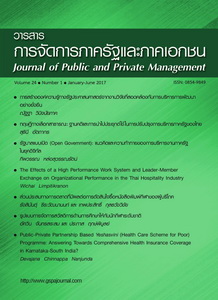The Effects of a High Performance Work System and Leader-Member Exchange on Organizational Performance in the Thai Hospitality Industry
Keywords:
High performance work system, leader-member exchange, organization citizenship behavior, human capital, Thai hospitality industryAbstract
Drawing on the resource-based view theory and the social exchange theory, this paper explores the relationship between a collectivism-high performance work system, leader-member exchange, human capital and organizational citizenship behavior, together with their effects on hotel performance in the Thai hospitality context.
Using survey data gathered from four hundred and twenty hotel staff in Bangkok, the statistical results reveal that the proposed model has a significant mediating effect that contributes to hotel performance. Based on the causal path model, organizational citizenship behavior is the key enabler on hotel performance. These findings reveal that collectivism-high performance work system and leader-member exchange are key antecedent factors and have a direct effect on hotel performance. However, human capital has only an indirect effect on hotel performance. This appears plausible since higher human capital may not lead to improved organizational performance which requires an interaction of the leader-member exchange relationship and the collectivismhigh performance work system to interact on organizational citizenship behavior that directly effects hotel performance.
As a practical contribution, the present study provides HR management and line managers with concrete insights. It provides a better understanding of the sequence of mechanism-HR practices and a social exchange relationship with the leader to enhance hotel performance.



